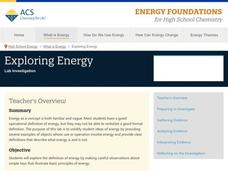American Chemical Society
Exploring Energy
When asked to list everyday objects that require energy, most people list technology that use batteries or electricity. Through hands-on exploration, young scientists discover energy is much more than just circuitry. They play with...
NOAA
Oceans of Energy
Are the earth's oceans really just giant batteries, waiting for their energy to be harnessed? Middle school mechanical engineers will be shocked by the amazing amount of energy that forms around them after diving into part four of a...
American Chemical Society
The Energy Efficiency of Heating Water
Can a small change in laboratory procedures save energy? Scholars test three different methods for heating water in a science lab. Then, they calculate the energy efficiency for each and compare them to determine which uses the least...
LABScI
Potential and Kinetic Energy: The Roller Coaster Lab
Ron Toomer, a famous roller coaster designer, suffered from motion sickness. Pupils design their own roller coasters, learning about potential and kinetic energy in the process. Labs focus on the importance of drop height, energy...
Science Matters
Energy Transfer and Transformation
When you take a simple task and create an exceptionally difficult way to complete it, it is known as a Rube Goldberg machine. These machines are filled with many types of energy transfers and energy transformations. Here, pupils watch...
Next Generation Science Storylines
Why Do Some Things Get Colder (or Hotter) When They React?
Some reactions absorb heat while others release it. Young scholars investigate both types of reactions in a 12-lesson unit. Each lesson presents a lab investigation that monitors temperature and considers the types of reactions taking...
Columbus City Schools
What’s Up with Matter?
Take a "conservative" approach to planning your next unit on mass and matter! What better way to answer "But where did the gas go?" than with a lab designed to promote good report writing, research skills, and detailed observation. The...
Magic of Physics
Loads Lab
Take a load off! Introduce junior engineers to the effects of load on structural design with an easy-to-use interactive. Individuals apply one of many load options, examine its effects, then learn about the safeguards employed during...
Rice University
College Physics for AP® Courses
Take a look at an organized physics course. The 34-section electronic textbook covers material in AP® Physics 1 and 2. Teachers use the text to supplement lectures and have the class work through the labs. Each section contains multiple...
Columbus City Schools
ABC: Acid Base Chemistry
Bubble, bubble, boil and trouble! What causes common substances like baking soda and vinegar to react the way they do? Welcome your junior chemists to the wonders of acid-base chemistry using a comprehensive and fun resource. Engage them...











